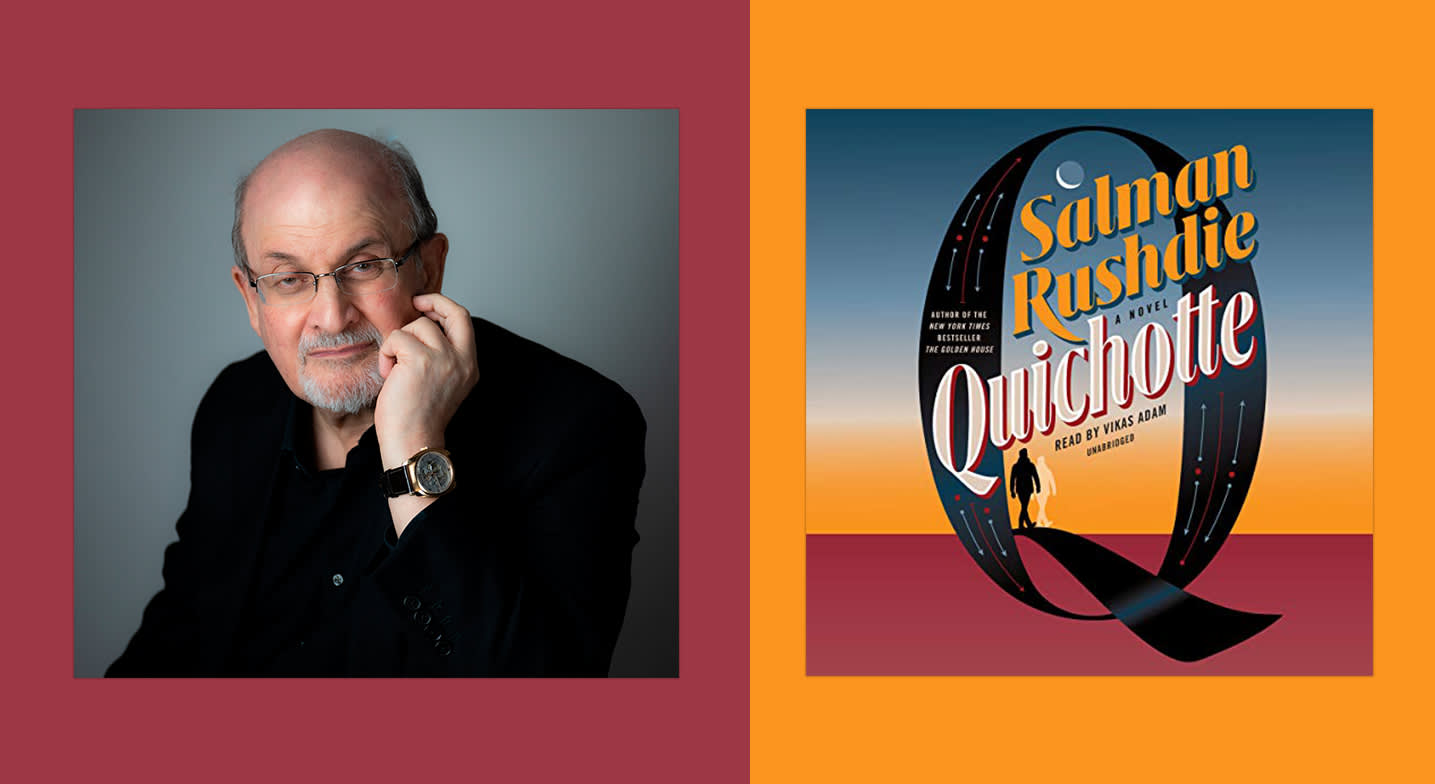Note: Text has been edited and does not match audio exactly.
Jerry Portwood: Hi, listeners. I'm Jerry Portwood, an editor here at Audible. Today, I'm thrilled to have the opportunity to speak with Jhumpa Lahiri, the author of beloved works in English, including two short story collections, Interpreter of Maladies and Unaccustomed Earth, and two novels, The Namesake and The Lowland, all of which explore the experiences of Bengali immigrants in the United States.
As many already know, Jhumpa moved with her family to Italy nearly a decade ago and immersed herself in the language. Since then, she has written two works of nonfiction in Italian, In Other Words and The Clothing of Books, and a novel, Whereabouts. She's also translated several novels by the Italian writer Domenico Starnone and has written a book of poetry that will be available soon.
She's returned to the United States and is currently teaching at Barnard College in New York City, and now, her latest collection, Roman Stories, which she also wrote in Italian and translated in collaboration with Todd Portnowitz, is available and narrated by a full cast.
I'm excited to have the opportunity to talk about the incredible stories in this collection and want to thank you so much for joining me today, Jhumpa.
Jhumpa Lahiri: Thank you. Thanks for having me.
JP: So, I'm not going to belabor the "Why Italian?" because I know you've answered it so many times in so many eloquent ways, and I'm sure you're tired of getting asked about it after all these years, right?
JL: A little bit, yeah. (laughs) It's a reasonable question, but it is hard because it's such an important question but difficult to answer fully or in a satisfying way, even for myself, you know?
JP: Well, I'll admit it, I wondered, but then if anybody listens to your memoir In Other Words—which you actually also narrated the audio version—I think you explain really well that even though it made it tougher, that you said it also made you feel freer. It just made me so impressed that you were brave enough to allow yourself to be that uncomfortable. Like, in Italian, you were learning how to write all over again in some ways, and you have to let yourself make mistakes. I guess I'm just curious, how were you able to embrace that unbearable awkwardness of feeling like you're starting over?
JL: I really had no choice. I mean, I felt that this was something I had to do, I had to experience. And it is very freeing because, among other things, it freed me from the notion of having to produce work or put out work in a world that, in the end, has to kind of toe the line because there are expectations placed on that work from the outset. And I didn't want to be in that place anymore. I wanted to write what I really needed to write and what I really wanted to write. And so, moving into Italian has allowed me to do that, and that's the most important thing for me, to be able to have that space.
JP: Do you mean also the topics, meaning that you felt like you were being hemmed in to writing about a Bengali immigrant experience?
JL: I just felt that there was going to be so much noise no matter what if I wanted to do anything differently. So, whether it's the topic—writing about a specific ethnic group and their experiences in any given time period—or whether it's my approach in a book, or whether it's the way I go about writing a short story or the way I go about writing a novel, just the idea of being able to try new things, try new ways, expand my repertoire, test myself as a writer, stretch myself as a writer, take chances, because I think writing should always be those things. There should always be that element of risk. You know, it's an enormous risk to make work and put it out there in the world. I felt instinctively that I had to—I had to move into another language to be able to do these things, in an environment in which there would be less noise and less, sort of, inherent ... almost a kind of censorship. Not an official censorship but remarks, you know?
I mean, I would never have dared write a book in verse in English. I would have been terrified to say to somebody, "Oh, now I'm not even working in prose anymore; I'm experimenting in this way." But it was a book I had to write, and I did. And it was important for me, so, that's something, you know? That's something very deep, very valuable.
JP: Yeah, one thing I heard you say before is that, as an artist, you don't always want to obey the rules, and so in Italian, it allowed you to break the rules because you didn't always know the rules, right? And you also had to depend on other Italian writers and editors to look over work and make sure that it made sense.
JL: Partly that. Partly because I was learning the rules; I was learning the rules as I was trying to abide by the rules. And then I got to the point where I thought, "Maybe it's more interesting to not put so much energy into the rules." But then, the other thing is just the way of approaching the story or novel, for example, so the way I wrote Whereabouts, or the way I wrote the central story in this new book, “The Steps.” I don't know why, because there's all sorts of writing happening in English as well—there really is. I mean, all sorts of writers are writing all sorts of ways, all sorts of approaches. But I think that people came to expect a certain kind of writing from me that's really not even about the topic. I would even here people say, "Oh, a Jhumpa Lahiri story." And I would ask myself, “What is that? That doesn't mean anything to me. I don't want it to become anything confining or identifiable." I mean, I would like everything I write to have some value to it, something of merit to it. And I go about it with that in mind, you know? But I didn't want to be placed in any kind of box.
JP: It's almost like you became that dreaded word, a “brand,” and as you said, a Jhumpa Lahiri story. (laughs) So now, are you frustrated when you hear people say that they feel like your English-first writing is different than your Italian-first writing? That there's somehow a distance from you as a writer for that reason?
JL: I think people just don't know what to make of what I'm doing, and they say all sorts of things. They'll either say, "Oh, now there are two Jhumpa Lahiris. You know, the English-language one of the first four books, and then this strange other one." I mean, this is what I hear more in the English-speaking world. Or some people have remarked that with this book, with Roman Stories, that somehow I'm to the old Jhumpa Lahiri. That I sort of took this strange journey, and now I'm back to where I was, which also feels ludicrous because, yes, it's the first short story collection I wrote since Unaccustomed Earth, but this book is very different from Unaccustomed Earth, and I should hope so because Unaccustomed Earth came out in 2008, you know?
JP: Right.
JL: (laughs) That was a long time ago, and I am still trying to develop and grow and mature as a writer from book to book—and change. As I said, try new things, test the waters, see if I can go out a little bit farther, you know? See if I can stay in the water a little bit longer, whatever the analogy would be, you know? Just test my limits, and it's interesting, because I'm working now with a very formal limit, which is a new language, and it will always remain a new language just by virtue of the fact that it's a language that I have not had in my system, in my brain, for most of my life.
So, that's the point for me, and I do feel that in Italian, I have had more freedom, perhaps because there were no expectations at all for me to produce anything in that language. I mean, literally zero. So, maybe that's what I needed. Maybe I needed the absolute sort of vanishing, to reach the vanishing point again, of expectation.
JP: I love what you say about the two Jhumpa Lahiris, partly because I've been obsessed with the idea of a doppelganger ever since ... for a long time, but I recently listened to Naomi Klein's book Doppelganger, and she gets into that idea and it's great. (laughs)
JL: Yeah. I love that theme as well in literature in general, so very rich.
“[The translations are] different. They're versions. It's like jazz, you know? I mean, they're takes. They're the same, but they're not the same.”
JP: So, in Roman Stories, I do want to talk specifically about the stories. Many of the characters are caught between worlds, and in the short stories, you detail the experiences of immigrants and expats and tourists and local residents who spent their entire lives in Rome and Italy, and there are obviously some instances of xenophobia and violence against people not considered real Italians. I'm resisting using the word native since it has a political tinge, and I suspect you would probably take issue with that.
JL: Yes, yes. Yes, I would, only because “native,” the word native, it's so charged, and it points the idea of origins and authenticity and ideas of purity, which are counter to the founding of Rome. So, if we're just going to talk about Rome, the founding of Rome is built on people coming in from all over the place and sort of becoming the population of the city, becoming Roman. So, Romans have always been becoming Romans. And so, what's interesting, all of these thousands of years later is that we're in a political moment in Italy, where ideas of nationalism are once again very strong and with the ideas of nationalism that opens the door to words like “native” and who belongs. Who is really originally from the place, and who is not?
And there is no way really, rationally, to say when does a person become one thing versus another when we're talking about a nationality. If we acknowledge that the world is full of places where enormous populations have immigrated and put down roots and raised families and new generations in soil, in “unaccustomed earth,” to quote and go back to Hawthorne. We know this. The fabric of the United States, since its founding in colonial times, and we know that this is the case in so much of the world, and I certainly know it in Italy. But in Italy, this word Roman, for me, is very important in the title because it does belong to each of the characters in the book, no matter where they're from.
JP: You spoke about and wrote about being othered while being there and how your husband would be considered more Italian because of the way he looked rather than you, and even though you spoke better Italian. (laughs) So many of these characters also experience that othering, and I was curious about how you related to that and brought that to the characters in these stories.
"Maybe because there was a more obvious, explicit expectation in my life as a child growing up in the United States to assimilate to American culture ... it inhibited me from writing about some of these very uncomfortable experiences of being othered when I was growing up."
JL: Yeah, I wanted to explore it in different ways with different life experiences. What that might feel like for people coming to the city, literally, for survival, for work purposes, to try to raise children or perhaps just to make some money to raise children who are in another part of the world. I wanted to think about it for people who choose to go to Rome, who choose to live there, who choose to be there, who want to be there and are still reminded that they are from the outside. In this book, maybe it is the Italian that frees me of it more in this book, as well, to go a little bit closer to the bone in terms of what those experiences feel like, because these experiences, yes, they're in this collection, but these experiences have been in my life for my entire life.
You know, it's not that I encountered these feelings for the first time in Rome. I grew up with these feelings in Rhode Island, but maybe because there was a more obvious, explicit expectation in my life as a child growing up in the United States to assimilate to American culture, to the English language and so forth, it was partly that that inhibited me perhaps from writing about some of these more sort of very uncomfortable experiences of being othered when I was growing up.
JP: Right.
JL: Whereas, in Rome, what I said about my work, that there'd be no expectation at all that I would ever produce any work in Italian and nobody in the universe ever expected that to happen—no one in Italy; no one in America; no one in India; nowhere, nowhere. But it happened. And so, similarly, I think my being in Italy is very liberating because there is absolutely no expectation. In fact, it's impossible because there's not even the sort of notion that I will ever become Italian, you know? Even though I love Italy very much, and I love my life in Rome, and I feel deeply at home there. But I feel deeply at home accepting that I am 100% a person who comes from the outside and will always be asked, in either a friendly or a not friendly way, "What brought you here?" Because when that question was asked to me in the United States, it always eroded this idea that I could ever become an American or ever be accepted, really, in the fabric of this place.
And in Italy, it's not even on the table as a question. And in some sense, because I now write in Italian, because I've been on this journey as an Italian language writer, I think that it's also an emphatic insistence as a writer, with my words on the page, on being a foreigner. If you sort of take the first four books in English—which come out of so much of my … they're not autobiographical books, in that sense, but they come out of my experiences, my way of being raised, shall we say, the world within the world in which I was raised, largely in the United States. In those books, the inclination is toward trying to become American or some sort of hybrid, you know? I mean, when I was growing up, there weren't these terms. We didn't have terms like Indian American.
JP: Mm-hmm.
JL: But imagine that. I mean, now it's like, “Oh, an Indian American author," you know? It's just one of a million labels we have to describe people from mixed backgrounds or other backgrounds. But it's still there. It's still there, okay? I mean, people still describe me as an Indian American author, not an American author.
JP: Right.
JL: It's simply the reality.
JP: Well, in the stories, you also inhabit some people who are born and spent their whole life there, for example, in “P's Parties,” which is from the point of view of an Italian man who was born in Rome and spent his whole life there. So, you, you obviously are inhabiting different perspectives. That story has now appeared in multiple versions—it's in Italian; it's in English; it's in The New Yorker (laughs), and now it's narrated by Ari Fliakos, which, in a way, is like another translation of this story—
JL: Mm-hmm.
JP: In the oral way. And I guess I'm wondering, do you think there's a better version of the story or one that you love more than another? Or are they all equal to you?
JL: They're different. They're versions. It's like jazz, you know? I mean (laughs), they're takes. They're the same, but they're not the same. Well, maybe one track is 10 minutes and one track is 14 minutes and one's a little bit more accelerated and one has a different tempo, you know? It's like that.
JP: I love that. It makes me think of all the different versions of Blade Runner. Like, which one do we think is the actual version now because there's so many?
JL: Well, I mean, I think this is very interesting, actually, because it goes into the whole idea of authenticity, which, of course points to native, original, who belongs, who doesn't, who is from the place and who is on the outside. I mean, to be authentically anything has been a driving ideology of human civilization, sadly, you know? I mean, it's clear to me at my age that I am 100% not authentic. I am totally inauthentic as a human being.
JP: (Laughs)
JL: But now I can own it. Now I can say, “That's okay. That's really okay.” I'm not going to apologize for it anymore, you know? But I was raised to feel horrible about it and to pay the price for it and to want to hide parts of myself and pretend parts of myself didn't exist and so on and so forth. So, I think this idea of the authentic, I'm experimenting with it in my work as well because, now I write in Italian, I translate myself—or partially or fully or what have you—into English and now, yes, there is an audio version. So, of course, these are all interpretations; they're versions; they're translations, They're different ways we can think about this. What happens in the Italian work, I'm more on the inside of two of the languages as opposed to, say, what will happen to my book in German, a language I can't read.
It's just more of a formal other object, other version of my book, that I can't connect to in any way linguistically.
“I think we need to sort of get some perspective on this word [authenticity] and what it means. I think it's a very dangerous word, actually.”
JP: Well, I love that you said it this way, because I do think people assume that you've somehow passed through some sort of filter or there's a scrim between your thoughts and what we're consuming because of translation of the thing. And you're saying, “Well, that's all perception.” Right? The idea of authenticity has its flaws.
JL: Very much so. I mean, I think we need to sort of get some perspective on this word and what it means. I think it's a very dangerous word, actually. A very problematic word for me.
JP: To go back to the stories, the book is separated into three different distinct sections, and the second one is, as you mentioned earlier, “The Steps,” which is very different for you and has these six sort of interlocked vignettes. First, I just want... For people who assume this is based off of the Spanish Steps, this is not, you know, that—
JL: No. (laughs)
JP: ... tourist destination, but a different set of steps, right? Tell me a little bit about, first, the setting, why you focused your attention to put all of these different stories on these steps.
JL: Because I am myself an extra in that story. I live next to those steps, so I'm on the steps all the time. They're my point of entry into the city on a daily basis and my way home, and it's the last bit of the city I encounter when I come back from wherever I am. And it's the first bit of the city I encounter when I walk out the door in the morning to start my day. It's my point of reference, and it's a rich, amazing, inspiring place, and it inspired these stories.
JP: So, I loved all the stories so much, but there is one in the third section that I think will stay with me for a long time. “The Delivery” broke my heart. Can you explain a bit about the inspiration for that character and story?
JL: So, in the story, I decided to go into two points of view, and it's told first from the point of view of this woman who basically works as a sort of housekeeper for another woman. And she's asked to go to the post office one day to pick up a package, and the package has been sent away already. So, she feels bad about it and sort of irresponsible and had hoped to be taking care of these various and sundry details for her employer. But on top of that, she's aware once she's in the post office, she sort of experiences a very quiet, unspoken form of xenophobia and mistreatment in that she's waiting and waiting, and she finally gets her turn. She's waiting, and there's somebody in front of her in line, and the woman behind the desk is sort of smiling and chatting with this one girl who's in front of her, and then when it's her turn, the response is very curt and rather rude.
And then, when she leaves the post office, she gets shot at by two kids on a motorino, by a compressed air gun. This was inspired by a newspaper article that I read about—immigrants in Rome being shot at, usually by very young people, with these compressed air guns. It was sort of a thing, and I don't know if it's still a thing, but it was a thing at one summer when I was in Rome. I can't remember now, but in the moment that I was there, it struck me. And I remember seeing a photograph of what it looked like when someone was shot with one of these guns, and that image really haunted me.
JP: You found inspiration from several newspaper articles. [The story] “Well-Lit House” also was based off of something you read, right?
JL: Yeah, yeah. I mean, in Rome, you know, my life is more... In the morning, I'll get up and, typically, I'll go get a coffee, and there will be some people and we'll talk. So even if not actually reading the newspaper, there's a sort of culture of you meet people, you meet friends, you meet acquaintances, and you talk about things. So, I don't know if I was actually opening the newspaper and reading about it, or maybe someone said, "Oh my god, did you hear about... Have you been following this terrible situation?" But then I did read several newspaper articles about it for the time that it remained a news story, because, of course, news stories don't last forever, you know? They only last for a certain number of days or weeks, and then the news moves on.
JP: Mm-hmm. So, as I mentioned, none of the characters have names. Sometimes they're referred to by initials or as the widow or the brothers or the professor, and I thought that was curious, and I wondered if that was intentional. Was there, in particular, a reason why you didn't want any of them to have specific names?
JL: No one in anything I've written in Italian has had a name. So, that's from the very beginning. So, every story I've written in Italian, there has been a lack of proper names with the characters, and that's just the way I'm now thinking about character. And it's another way of opening up our understanding of who we are and where we're from and this whole business of "Where are you from?" and authenticity and who is Roman and who is not Roman. It would ruin the entire enterprise, I think, of what I'm trying to explore as a writer right now if I were to call, you know ... Give certain characters Italian names or certain characters other names.
JP: Mm-hmm.
JL: I'm not interested in that because I want to push back against that idea, that reductionist idea that if you have a name, it means a certain thing, and it ties you to a certain place.
JP: Right. It's working against our sort of internalized biases. Like, if we hear Paolo or Nancy, we're gonna have different ideas of who the person is.
JL: Immediately. Immediately, because they're ways of, you know, giving... You know, names come with coordinates. It's just the way it is. They come with ethnic coordinates, cultural coordinates. This has always been the case.
JP: So, I also want to say (laughs), I laughed out loud at the final lines of the last story, “Dante Alighieri.” I don't want to give it away for those who haven't listened yet, but it's perhaps one of my favorite endings of a story ever, so I just wanted to thank you for that. It was great.
JL: Thank you. (laughs)
JP: It was surprising. (laughs)
JL: Thank you so much.
JP: I did want to ask you about the title; it's sort of a reference to Alberto Moravia's Roman Tales, correct?
JL: It's a total reference. It's a direct, unabashed reference. It's a citation—a citation of his title.
JP: And why is that significant, for people who might not be familiar with his work?
JL: Well, he wrote, famously, an enormous cycle of stories called Racconti Romani, which is Roman Stories or Roman Tales, translated into English, and they're short stories set in Rome in postwar Italy. He's looking at all sorts of lives, all sorts of characters—people often sort of living on the edge and alienated from their circumstances. I read his stories. I studied them. I admired them for their many, many merits, and I owe him a lot as a writer. So, that's part of the reason this book is called Roman Stories, but the other is also I want to really explore or push or challenge the easy assumption or expectation of what being Roman means.
Because it has changed, and it has changed since Moravia's time. The definition of what is Roman and who is Roman, that is clear, even if the government doesn't agree. The definition of Roman has transformed in all sorts of interesting ways.
JP: Absolutely. All right. Well, Jhumpa, it's been such a pleasure talking to you today.
JL: Thank you so much. It's been a pleasure for me as well.
JP: And listeners, Roman Stories is available on Audible now.







